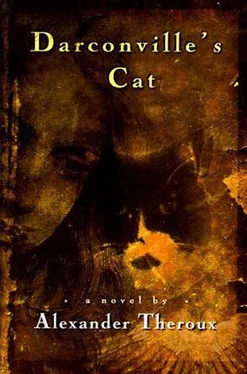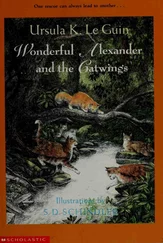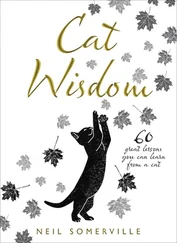The flag, indeed, still flew. And yet a paradox presented itself, for the democracy which that flag represented was somehow the same democracy that the admission board, the administration, and the alumni were under jurisdiction, sometimes, in fact, by federal writ, to oblige — resulting in a perceptible latitudinarianism which included, among other things, extended curfews, widening of student privileges, faculty raises, the lowering of entrance requirements (two new highrise dorms had to be filled) and now a consideration for the actual admission of black students!
The South was trying to rise again. But where was the yeast? “Freedom,” as President Greatracks had said on many occasions, “is all very well and good, but—”
Do what thou wilt, thou shalt not so,
Dark Angel! triumph over me:
Lonely, unto the Lone I go;
Divine, to the Divinity.
— LIONEL JOHNSON, “The Dark Angel”
“I NEED IT’!”
“That’s a lot of pudding, miss.”
“I’m signing up, anyway.”
“The course, I told you yesterday, is not open to seniors,” exclaimed Mrs. McAwaddle, the registrar, her mouth cemented shut against the possibility of further discourse.
“My daddy,” the girl drawled, charging through in interruption and waving a slip of paper, “had the dean on the telephone last night. Now, y’all want to read this?”
The student, obviously used to exacting compliance, was an arresting young beauty in sunglasses with a soft pink sweater, raven-black hair cut to perfection, and a pout of wet lipstick that made her mouth look like a piece of candy. She stepped back, unvanquished, and seemed satisfied to wait, speaking to no one but admiring from a corner the indisposition of the other girls there who were trying to arrange their schedules during the first discouraging days of registration. They shuffled about in determined little squads with drop/add cards, course syllabi, and countless papers to have signed and stamped.
The room was warm, sticky, from the crowding bodies, but the girls, somehow, all smelled of fresh soap and mint-flavored gum. They were Southern girls, after all, and unlike their counterparts in other sections of the country whose morning beauty, from the normal wear-and-tear of a day, too easily faded only to be carelessly ignored, they tried to keep powder-room perfect and as presentable as possible. And, after all, this time there was a man present in the room.
“Some people can just whistle and wait,” snapped Mrs. McAwaddle, going jimmy-jawed. A mite of a thing, resembling the perky little owl commonly depicted resting on the hand of Minerva, she was wearing a dress covered with hearts. She spindled a card angrily and looked up at the man who’d been standing there for some time. And now. His name? His business?
“Darconville,” he said, smiling.
The girl with the black hair, waiting behind him, took a crystal vial out of her handbag (tooled in studs: “H.P.”) and, closing her eyes, sprayed a musky lavender fragrance around her perfect, prematurely formed silhouette, waxen as a delicate shell.
“Ah, of course,” beamed the owl of Minerva, “the new professor.” They laughed together. “And I do believe I detect a Yankee accent?”
Darconville asked about his courses. He had met his freshmen already but hadn’t yet been given the list.
“Your freshman class list? O dear,” muttered Mrs. McAwaddle. Apparently, it had been forced into more revisions than a Dixiecrat caucus and so laid aside. She searched a tray, lifted up a snow water-ball of glass, and then shot open an acidgreen file-cabinet, finally rummaging up the sheets for English 100. He read the first few names on the list:
Muriel Ambler
Melody Blume
Ava Caelano
Wroberta Carter
Barbara Celarent
Analecta Cisterciana
“Would you let me,” smiled Mrs. McAwaddle, her little head at a prayerful angle, “admire your coat?” Several girls nearby exchanged glances and winked. Darconville’s coat people loved. Cut to princely lines, it was an English chesterfield as black as the black swan of Juvenal. “I do declare, if this isn’t the most dashing — but here,” she added, hunching up to the desk, “there’s an ever-so-small tear here, by that button.” She patted his hand. “Now you have your wife mend that and—”
Darconville leaned forward and, like Wotan consulting a weaving norn, whispered with a close smile, “I am not married.”
Mrs. McAwaddle stared a moment — and then, with a conspiratorial wink, motioned him into a side-room off the registrar’s office where under a portrait of Jefferson Davis a purple-stained mimeograph machine went bwam-bwam-bwam , spitting out single sheets of copy. Conventicle gave way to conclave. “Always remember,” she said, gripping his wrist, “to a handsome boy like you — how old are you?”
“Twenty-nine.”
She made the sound of a pip. “—to a handsome boy like you something wonderful will happen. You’ll find a girl to love you as sure as wax candles have wicks.” She had lost her own husband, she told him, eight years ago (tainted knockwurst, Jaycee picnic), and now it was just hell dipped in misery. To live alone? When the good Lord created someone for everybody? Ridiculous! “But now,” she added, folding his hands in her own, “you be careful: these girls at Quinsy College can work the insides out of a boy without him having a clue and, simple yokums though they may seem, can be the untellinest little commodities on earth. You saw that child out front fussing at me? I could have spit nails. They have nerve to burn.”
For the advice of this little hole-in-corner sibyl Darconville was grateful, though he couldn’t help but attribute her suspicions to the exigencies of her job, and, excusing himself, he worked his way out of the office, looking up only once: but then to catch, above a blur of fluffy pink, a perfect face unblindfolding slowly from a pair of sunglasses the fire-flash of two beautiful but dangerous eyes in which, he thought, he detected a sly, premeditated smile. He paused in the outer corridor and once again looked at the names entered alphabetically on the list; it read like a spice chart:
Ailsa Cragg
Childrey Fawcett
Galveston Foster
Scarlet Foxwell
Opal Garten
Marsha Goforth
LeHigh Hialeah
Elsie Magoun
Sheila Mangelwurzel
A single name there meant something more than it was: a symbolum — both a “sign” and a “confession.” But which one was it? Which one was hers? It was curious, his preoccupation, for he’d seen her only once. Inexplicably, however, it mattered, if only for the hardly momentous irony that by knowing it he could then immediately dismiss it and put an end to it all. Her look had injured a silence in his life. The known name might somehow injure the look, and with the look gone the silence could continue, allowing him in consequence and inducing, for diversion, the equanimity to create out of the dormitive world the something out of nothing we call art. There was actually scant attention being paid to this unnamed girl in the upper part of his mind, but in the lower reaches she several times appeared, a thing, rather like the libration of the moon, alternately visible and invisible.
He flipped a sheet and read more names.
Christie McCarkle
Trinley Moss
Glycera Pentlock
Hallowe’ena Rampling
Isabel Rawsthorne
Cecilia Sketchley
Darconville couldn’t help but smile. The names seemed absurd, but one didn’t really have to spend very much time down South to realize the regional compulsion for this particular extravagance, daily coming upon such weird examples as: Cylvia, Olgalene, Marcelette, Scharlott, Coquetilla, Mavis, Latrina, Weeda and Needa, Mariedythe, Romiette, Coita, Vannelda, Moonean, Rhey, Flouzelle, Balpha, Erdix, Colice, Icel, and Juella, all desperate parental attempts to try to work some kind of sympathetic magic upon their daughters from the very start. And yet how was it that upon hearing them one saw only majorettes, waitresses, and roller-derby queens?
Читать дальше












